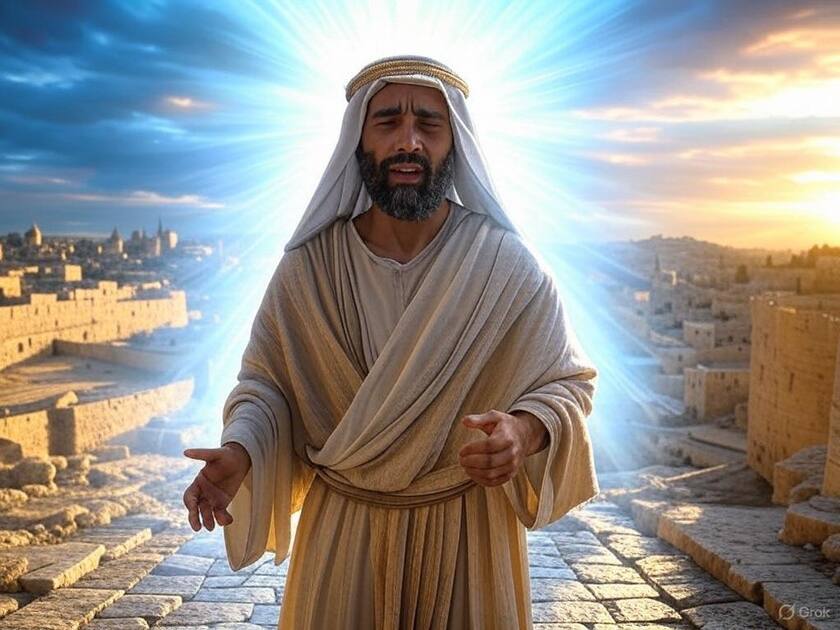Don’t Look Back: Faith for the Everyday and the End Beyond Sincerity
Luke 17:1-4
And he said to his disciples, "Temptations to sin are sure to come, but woe to the one through whom they come! It would be better for him if a millstone were hung around his neck and he were cast into the sea than that he should cause one of these little ones to sin. Pay attention to yourselves! If your brother sins, rebuke him, and if he repents, forgive him, and if he sins against you seven times in the day, and turns to you seven times, saying, ‘I repent,’ you must forgive him."
And the disciples replied:
Luke 17:5
The apostles said to the Lord, "Increase our faith!"
At least they were being honest. Obviously, they couldn't imagine forgiving their brother who is forever acting so ungrateful that he is constantly sinning.
Jesus is laying out a challenging reality for His followers. Sin and temptation are inevitable, but the responsibility to not lead others astray is a heavy burden to lay on us. Jesus isn't as focused upon the sin as he is on the one who caused someone to sin. It’s a high bar, and the disciples’ reaction, "Increase our faith!", shows they get it.
They don’t pretend they’ve got it all figured out. They recognize their limits and cry out for help. It’s a reminder that living as a servant of the Lord, isn’t about mustering up perfection on our own, it’s about leaning into faith, trusting God to stretch us beyond what we think we can handle.
As if to illustrate this point, right after the disciples ask for more faith in verse 5, Jesus responds in verses 6-10 with the mustard seed analogy and the servant parable, and then in verses 11-19, we get this vivid example with the ten lepers. And then we receive a prophecy about the future kingdom of heaven at the second coming. Or is to about the future only?
Luke 17:20-21
Being asked by the Pharisees when the kingdom of God would come, he answered them, "The kingdom of God is not coming in ways that can be observed, nor will they say, ‘Look, here it is!’ or ‘There!’ for behold, the kingdom of God is in the midst of you."
After a more in-depth explanation about the coming tribulation and the exodus of the church, Jesus follows up with this:
Luke 17:37
And they said to him, "Where, Lord?" He said to them, "Where the body is, there the eagles will gather."
I wanted to leap ahead quickly here because I really think Luke intends that we take all of chapter seventeen as a whole body of a larger message. Jesus is layering these teachings together to build a bigger picture for His disciples, and for us. After the mustard seed analogy (faith small but potent enough to uproot a tree) and the servant parable (doing what’s expected without fanfare), and the ten lepers, show us faith in action. Then, bam, we pivot to the Pharisees’ question about the kingdom in verses 20-21. Jesus’ answer, "the kingdom of God is in the midst of you", is a curveball. They’re looking for a grand, visible takeover, but He’s saying it’s already breaking in, right there among them, through Him. It’s subtle, internal, not a spectacle you can pin down with a 'Look, here it is!' The mustard seed is small, almost hidden, but very potent. And faith is like this. It's invisible to those who cannot or will not share in it. It’s like Jesus is saying: "You want more faith? It’s not about seeing the whole plan, it’s about trusting Me now, serving faithfully in the small stuff, because the kingdom’s already here, and it’s coming in full later." Like the lepers who went to the priests without knowing the outcome. They obeyed his instructions and at least one showed his thankfulness for the opportunity.
To me it feels like He’s equipping them for both the everyday grind and for the long haul, with the final push being laid out for all Christian people at the second coming which looms on the horizon. He's preparing them for a time when many will get it wrong, and others will get it right. Both may have faith, but something is missing with one.
The "days of Lot" comparison, alongside Noah’s, paints a picture of two groups: those who have faith but miss something critical, and those who get it right. It’s not just about believing in Him; it’s about what that belief produces in how they live, especially when the stakes get high. In Lot’s story, you’ve got the townspeople who are totally blind to what’s coming, faith isn’t even on their radar. Then there’s Lot himself, who’s called "righteous" in 2 Peter 2:7-8 because he was grieved by the sin around him, yet he’s hardly a model of decisive action. He’s got some faith, enough to be spared, but it’s shaky, half-hearted, missing that full surrender Jesus keeps pointing to. Compare that to Noah, who builds the ark in obedience over decades, or the one leper who returns to worship, there’s a completeness to their response, a faith that acts and aligns with God’s heart.
In Luke 17:33, right after the Lot reference, He says,
"Whoever seeks to preserve his life will lose it, but whoever loses it will keep it."
Jesus seems to be warning the disciples, don’t be the "faith but…" crowd. The ones who get it wrong might have faith in Jesus as a concept, a healer, a teacher, but they cling to their own agendas, their comfort, their "goods in the house." They seek to save their lives. Clinging to the earth, I imagine many who will cling to their life as the church is being taken up. Like someone struggling to not sink into quicksand they'll struggle with letting go when the Lord comes.
The "faith but…" crowd isn’t just casually indifferent; they’re actively gripping onto what they know. That phrase, "whoever seeks to save his life will lose it" (Luke 17:33), cuts deep here. It’s not just about physical stuff, it’s the whole mindset of self-preservation, of refusing to fully release control to Him. And imagine a people who refuse to come because it doesn't fit their religious agenda. Jesus already hints at this kind of disconnect with the Pharisees in verses 20-21, asking when the kingdom will come, expecting some observable, triumphant event they can validate on their own terms. He shuts that down, "the kingdom of God is in the midst of you", but they miss it because it doesn’t fit their checklist.
Fast-forward to the end, and you can see it, folks so locked into their own theology and worldview, their own timelines, and their own image of how Jesus should return, that they reject the real thing when it doesn’t match up. Think about Lot’s neighbors in Sodom. Genesis 19:9 says they mocked him when he warned them, calling him an outsider who’s playing judge. They had their way of life, their norms, and no angel or fire was going to disrupt that, until it did.
And then comes the second coming. "No, this can’t be it. Where’s the seven-year checklist? Where’s the temple rebuild? This isn’t our rapture."
Sure, they’ve got faith, but it’s faith in their system, not in a sovereign move of God. Like the "faith but…" group, they’re clinging, not to material goods this time, but to their intellectual or spiritual turf.
Jesus is warning in Luke 17:34-35
"One will be taken and the other left”
He doesn’t care about your resume or your dogma. It’s about readiness, not religion. The disciples are being trained to ditch their agendas, to serve Him in faith and follow without dictating His plan on their terms.
What if our "letting go" isn’t just about stuff, but about our need to control the narrative? A people refusing to come because it’s not their Jesus, it’s the ultimate quicksand, isn’t it? It's like where we began, struggling with forever forgiveness and a small but persistent faith.
The disciples in Luke 17:1-4, wrestling with forgiving a brother seven times a day, are hitting the same wall, control. Forgiving that much means releasing the narrative of justice or pride they want to hold onto, it’s a small, persistent faith that says, "I’ll trust You, Lord, even when it doesn’t feel right." They cry, "Increase our faith!" because they know they’re short on that surrender.
Fast-forward to the second coming, and it’s the same test, magnified. Letting go isn’t just about stuff or grudges, it’s about ditching the need to dictate how God works. A people refusing to come because it’s not their Jesus? That’s the disciples’ struggle on steroids. They’ve got faith, but it’s tethered to their script.
Will you look back like Lot’s wife glancing back or the Pharisees missing the kingdom in their midst?
The mustard seed faith Jesus describes in verse 6 isn't powerful because it's sincere. It's small but mighty, it moves mountains precisely because it doesn’t demand control; it trusts.
Today "the church" feels this tension hard. Endless end-times debates. Pre-trib, post-trib, amillennial, whatever, all of it can become battlegrounds where we’d rather die on our hill than admit we might not have it all figured out. And I'm not guiltless in this regard. I come down in the Midtrib camp.
Each camp’s got its verses, its logic, and its champions. And we dig in, ready to defend our turf like it’s the gospel itself. I get it; there’s comfort in having a map. For me, Mid-trib’s got that appeal of balancing the "we’ll suffer some" with "we’re out before the worst of it", it’s a solid hill to stand on for me and in this I admit that I will have to face the end in faith. My faithfulness will face a test, I believe that and pray that I will be found having faith. It’s not dodging the hard stuff or banking on a free pass. I’m ready to endure, but I trust in deliverance too.
Jesus doesn’t sugarcoat it; temptations come, forgiveness stretches us, the end hits sudden and sharp. Mid-trib or not, the rubber meets the road when the suffering kicks in, when the Son of Man is revealed, and the quicksand’s pulling at everyone else. Praying to be found with faith, that’s the heartbeat of servanthood Jesus is drilling into them. Not a perfect eschatology, but a persistent trust.
That's test we're all bracing for, it’s already in the everyday, isn’t it? Forgiving the seventh time, serving without applause, letting go of the need to be right, it’s all prep for the big one. Don't miss it like the Pharisees. Don't look back like Lot's wife. And remain obedient to what Jesus taught, don't become like Lot's daughters who perverted the faith. That test we’re all bracing for isn’t just some distant finale; it’s woven into the fabric of our everyday.
We're not just surviving those tests; we're thriving through them. The real deal is staying obedient to what Jesus taught; forgive, serve, trust, repeat. Being sincere isn't enough, Paul (as Saul) was very sincere in his faith when he persecuted the Christians WITH ZEAL! Acts 9:1-2 shows him "breathing threats and murder" against the church, fueled by zeal and sincerity.
Was that the breath of God?
Hell no!
He was all-in, convinced he was serving God by crushing Christians. A Pharisee with credentials, Torah knowledge, the works (Philippians 3:5-6). Yet he was dead wrong until Jesus blindsided him on the Damascus Road. Sincerity without alignment to Christ? It’s a misfire, even a dangerous one.
The Pharisees were sincere in their kingdom hunt, but they missed Jesus standing right there. Lot’s daughters were sincere in their desperate plan to preserve their line, but it twisted into sin. Sincerity’s not the ticket, obedience to what Jesus taught is.
Paul’s turnaround in Acts 9 proves it: once he met the real deal, he didn’t just tweak his zeal, he redirected it to forgive. It’s not enough to mean well or feel passionate, thriving means syncing up with Jesus’ rhythm, not our own.




















